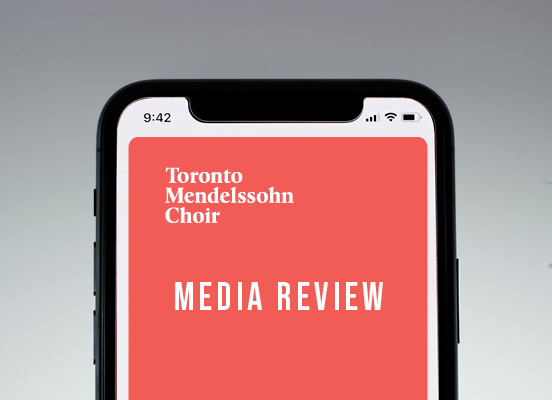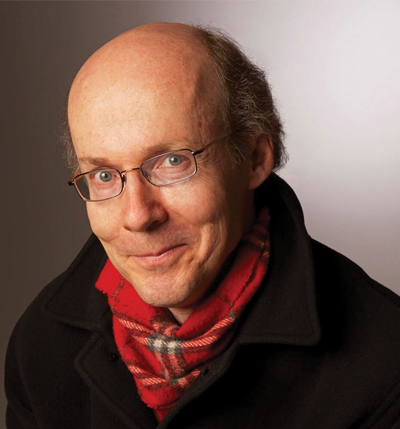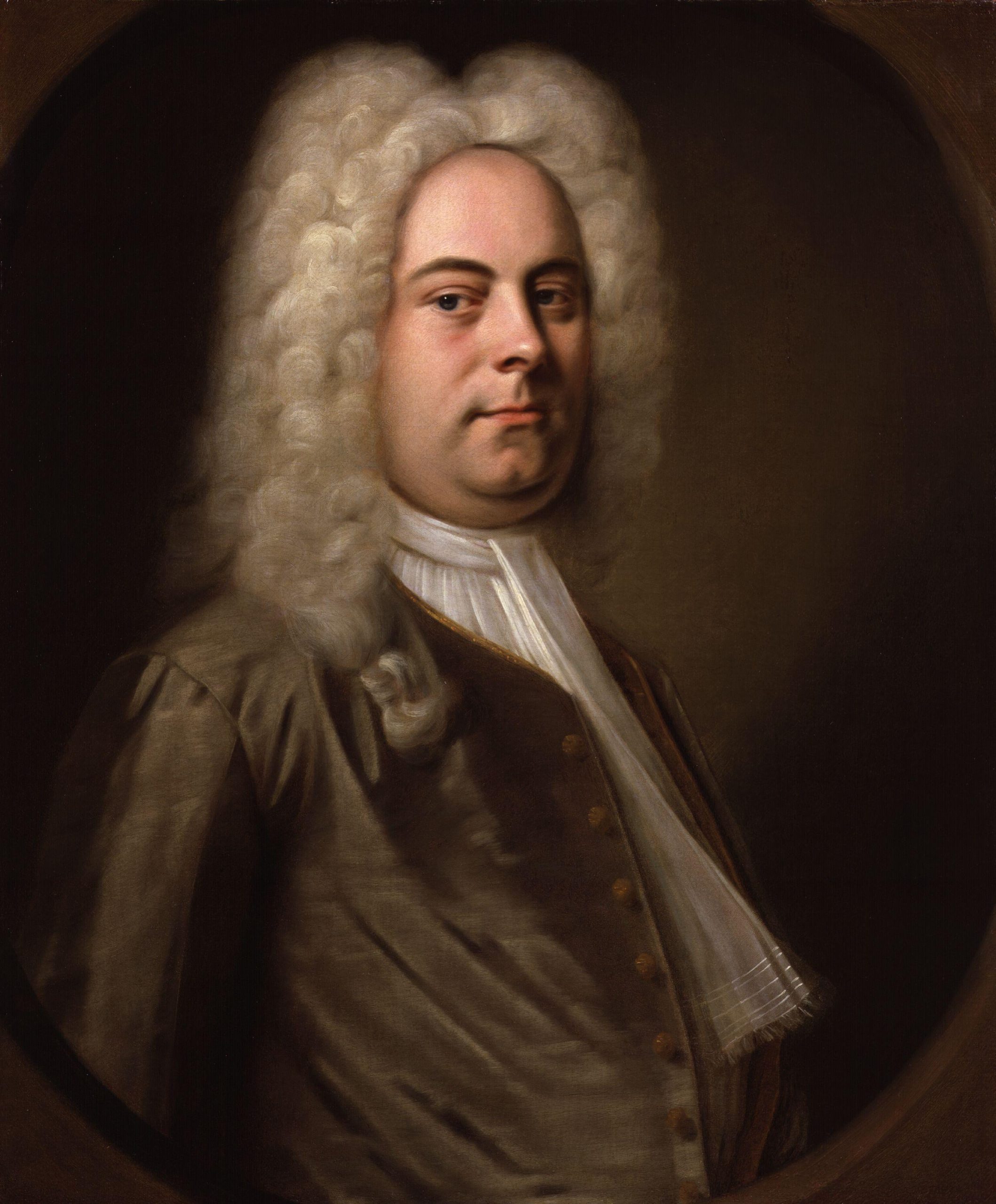Media
Media Room
April 23, 2019
Toronto Mendelssohn Choir inspired by new venue for Sacred Music in a Sacred Space
2018-19 Season

David Richards, Toronto Concert Reviews. The Toronto Mendelssohn Choir found a new venue for its annual concerts for Holy Week,Sacred Music for a Sacred Space. The new location, St. Anne’s Anglican Church, has a beautiful Byzantine style structure that dates to 1907 with interior decoration and paintings completed by J.E.H MacDonald and other members of the Group of Seven. Before the concert began many of the early birds in the audience were out of their seats getting closer looks and photos of the iconography on the walls and ceilings The symmetrical shape and the domed ceilings gave a warm acoustic without the excessive decay of Gothic styled churches. The setting was clearly one of Interim Conductor and Artistic Advisor David Fallis’s inspirations for the program.The first half of the program was clearly designed to set the tone for a meditative experience. Two reflective motets by French composers opened the concert.
April 4, 2019
David Fallis leads Toronto Mendelssohn Choir in a program of 20th century a cappella works for Sacred Music for a Sacred Space – April 17 and Good Friday, April 19
2018-19 Season

TMC’s popular annual Sacred Music concerts are intended to provide a moment of calm for patrons with a program of contemplative a cappella music. For 2019, David Fallis has created a program of 20th century composers with the first half featuring composers from France and Switzerland, while the second half features composers from Eastern Europe and Russia.David opens the concert with Olivier Messaien’s O sacrum convivium – a composition to help patrons step out of time. In his program notes, David remarks that this motet is “a perfect example of Messiaen’s preoccupation with the suspension of the perception of time in music by the use of extremely slow tempos and subtle changes in length of notes, all designed to bring us closer to something outside of time, eternal.” The first half also includes Poulenc’s Salve Regina and Martin’s Mass for Double Choir, all performed by the 70-member Mendelssohn Singers.The second half of music of the Eastern Orthodox Church will be sung by the full TMC.
April 4, 2019
Sacred Music for a Sacred Space 2019 Program Notes
2018-19 Season

Welcome to Sacred Music for a Sacred Space. All of the works on tonight’s program come from the 20th century, the first half from France and Switzerland, the second half from eastern Europe and Russia, with the exception of Healey Willan’s masterpiece which concludes the evening.In earlier periods of European musical history, sacred music was often written by composers who essentially earned their living from the church, and one cannot really know how much the composer was writing from a position of deeply held faith, or writing what was required, often brilliantly, much as an opera composer has to be able to create music which is suitable to many situations or characters. As the influence of the church as employer diminished in the late Baroque and Classical periods, less sacred music was written, and the 19th century sees much more emphasis on symphony, opera and chamber music than on sacred music. There are not many Romantic composers whose chief claim to renown is their sacred music, and it is not by chance that the greatest works of 19th century sacred music are Requiems (Verdi, Berlioz, Brahms), in which one muses on death, a human condition not restricted to people of faith.So by the 20th century it is a decided choice for a composer to write sacred music, and many of the composers represented tonight write from a position of faith, if not always entirely orthodox.
February 28, 2019
Toronto Mendelssohn Choir’s Haydn and Handel celebration lifts the spirits on a blustery winter night!
2018-19 Season

Dave Richards, Toronto Concert Reviews. It was a miserable night to trudge downtown. The six or more inches of snow and slush were enough to discourage many from heading out. By mid-afternoon in Oakville when I learned that the GO trains would be cancelled for several hours, my own attendance was put in doubt. But for those of us who did brave the weather to St. Andrew’s Church, The Toronto Mendelssohn Choir and their Interim Conductor and Artistic Director David Fallis made it more than worth our effort with a celebration of Haydn and Handel.
February 11, 2019
Conductor David Fallis to lead Toronto Mendelssohn Choir, orchestra and stellar soloists in Haydn’s Missa in tempore belli and Handel’s Coronation Anthems
2018-19 Season

Conductor David Fallis has put together a stellar group of soloists for this concert of two beloved 18th century greats on February 27, 2019. The Choir and orchestra will be joined by soprano Mireille Asselin, mezzo-soprano Christina Stelmacovich, tenor Asitha Tennekoon, and bass-baritone Stephen Hegedus.
Of the Missa in tempore belli, David writes in the program notes:
“The mass has many extraordinary touches. The overall feel is optimistic and confident, appropriate to the basic key of C major, but the beautiful cello and bass singer duet at the Qui tollis in the “Gloria”, the deeply moving Et incarnatus est in the “Credo” and the gorgeous harmonic colouring at so many moments mark this mass as the work of a great composer working at the height of his powers.”
February 11, 2019
Program Notes: Handel and Haydn, February 2019
2018-19 Season

Haydn’s Missa in tempore belli (Mass in time of war) is so called because it was written in 1796-97 as Napoleon’s forces were advancing towards Vienna. In German-speaking countries it is often referred to as the Paukenmesse (Timpani Mass): the timpani does play a significant part in the mass, especially in the Agnus Dei where Haydn uses a brilliant drum solo to heighten the intensity of the movement’s prayer for mercy and peace.
The mass has many extraordinary touches. The overall feel is optimistic and confident, appropriate to the basic key of C major, but the beautiful cello and bass singer duet at the Qui tollis in the “Gloria”, the deeply moving Et incarnatus est in the “Credo” and the gorgeous harmonic colouring at so many moments mark this mass as the work of a great composer working at the height of his powers.
January 10, 2019
Spotlight on North America: Toronto Mendelssohn Choir FREE Community Concert and Webcast
2018-19 Season

Spotlight on North America. Saturday, January 26 at 3 pm EST.
Interim Conductor David Fallis has put together a program featuring works by Canadian and American choral composers for the TMC’s 2019 free community concert. David notes
“We want to shine our spotlight on three key areas: the exciting new generation of Indigenous artists across Canada who are leading contributors to so many aspects of our cultural life, choral music included; local Toronto composers from Healey Willan to Stephanie Martin; and the fact that some of our most alluring melodies are folksongs whose origins are obscure but which live on in lively arrangements by important composers.”
This concert is a wonderful opportunity for people to hear the Grammy-nominated 120-voice Toronto Mendelssohn Choir and discover some stunning contemporary choral music, including two works by Andrew Balfour, the prominent Winnipeg composer of Cree descent.
December 19, 2018
Toronto Symphony–Mendelssohn Choir Messiah
2018-19 Season

Leslie Barcza, barczablog. Toronto is Messiah town, as I’ve joked before. Handel’s most popular Biblical oratorio is everywhere at this time of year.
Tonight I took in the second of six offered this week by the Toronto Symphony, the Toronto Mendelssohn Choir and soloists under the baton of Johannes Debus, the Music Director of the Canadian Opera Company. We’ve heard him lead operas at Four Seasons Centre, I wondered what he’d be like leading an oratorio down the street with the TSO & TMC.
And in fact it was the cleanest clearest Messiah I’ve heard at Roy Thomson Hall.
December 18, 2018
Toronto Mendelssohn Choir Makes Handel’s Messiah Shimmer With The TSO
2018-19 Season

Arthur Kaptainis, ludwig Van Toronto. The Toronto Symphony Orchestra presents Handel’s greatest hit every December, generally with a new conductor. Our Messiah maestro this year is both familiar and surprising: Johannes Debus. On Monday, the music director of the Canadian Opera Company oversaw a performance in Roy Thomson Hall that was agreeable in particulars but lacking something in drama.
The stars of the show, numbering about 110, were in the loft. Clearly, the Toronto Mendelssohn Choir has not lost interest in this annual assignment. “For unto us a Child is born” was exuberant and the stresses of “Let us break their bonds asunder” were spot-on. Sections were perhaps not of exactly equal strength — we all know which letter comes first in SATB — but counterpoint was vigorous and the tone was lucid at all dynamic levels. This great institution seems to be thriving under the interim supervision of David Fallis.

